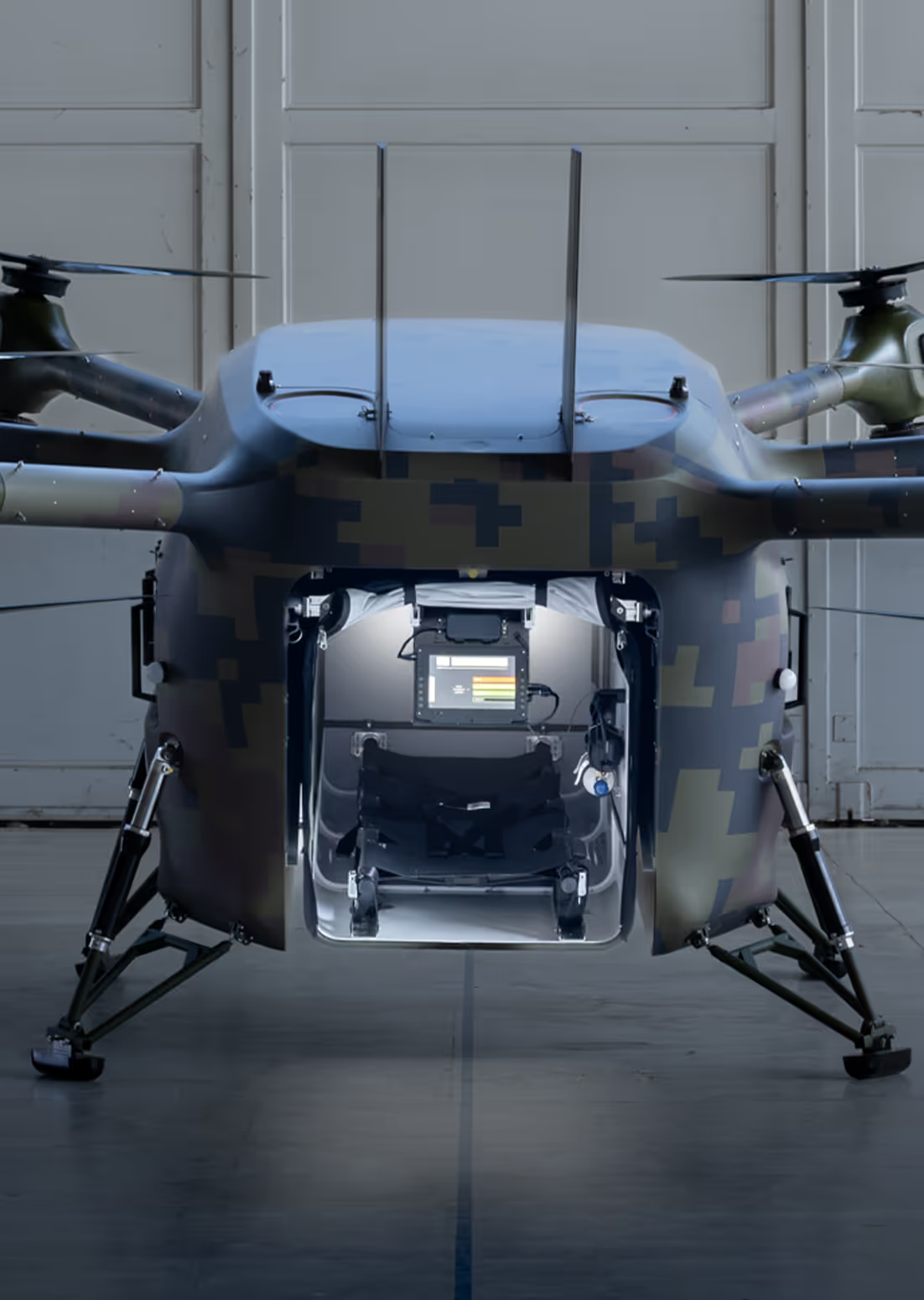Fast Response. Tactical Simplicity.

Grille is an uncrewed drone for patient transport.






























Many years of practical experience and clinical research in emergency medicine have proved that mortality and time to operation are heavily correlated. The longer the free therapy interval, the lower the survival probability of the patient — especially for penetrating traumas such as gunshot wounds. Delay to the operating room of more than 10 minutes increases the risk of mortality by up to threefold.

Forward Uncrewed Evacuation.
The aircraft complements the standard assets of the evacuation chain and acts as a force multiplier for existing capacities. When operational or tactical circumstances demand additional resources, the system can be rapidly deployed.
"Amateurs discuss tactics; professionals discuss logistics." – Napoleon Bonaparte. Modern battlefield effectiveness depends not only on decisive action but on uninterrupted supply chains. Critical items such as blood products, tourniquets, ammunition, or communication gear must reach the point of need within minutes. Any delay in resupply can paralyze frontline operations and increase casualties.

Enhances frontline logistics by complementing standard supply methods with on-demand delivery. When operational tempo, terrain, or threat conditions exceed the capacity of conventional assets, Grille serves as a force multiplier.












Adaptable operator roles for dispatcher, medical, and payload control — configured to match mission requirements.
.svg)
Ruggedized, man-portable case system. Deployable in vehicles, containers, tents, basements, or naval platforms depending on tactical needs.
.svg)
Fully integrated with standard battle management systems for live access to mission data, sensor feeds, OR status, and logistics capacity.
.svg)
High automation enables two operators to manage and monitor multiple concurrent missions simultaneously.
Enclosing Diameter
7.8 m (25 ft)
Propeller Diameter
2.25 m (7 ft)
Packing Size
20 ft ISO-Container
Cruise Speed
86 km/h (47 kts)
Service Ceiling
2100 m (6890 ft)
Range
51 km (32 NM)
Patient
135 kg (298 lb)
Medical Cabin
40 kg (88 lb)
Total Payload
175 kg (386 lb)
Maximum Takeoff Weight
750 kg (1653 lb)
Max. Power
240 kW (326 HP)
Powertrain
Full electric
Safety
Fail-safe system design
Flight Control
Primary and secondary flight control system
Navigation
Satellite and inertial navigation
Data Links
Multiple LOS and BLOS links
Rescue System
Ballistic parachute
Ground Control
Duplex GCS integrated in mobile PECC
Battle Management
Integrated for planning and monitoring

Armor is possible but payload intensive. The preferred approach is to fly at very low altitude, follow terrain contours, and apply tactical routing. In high-risk zones, coordination with UGVs or ground support can bridge the last meters.
Many military medical professionals now consider it a moral imperative to use autonomous systems — especially when conventional evacuation is unavailable due to capacity constraints or operational risk.
The primary concept of operations is direct transport from the casualty collection point to a Role 2 facility, where surgical care becomes available. Other mission profiles — such as relieving overburdened Role 1 units by transferring patients to Role 2 — are also feasible.
The drone operates with a swappable battery set. While one set of batteries is in use, the spare set is charged in parallel. Upon landing, batteries are exchanged within one minute, allowing for immediate redeployment.
Yes. The modular payload bay allows for mission-specific kits, including logistics containers, sensors, or electronic warfare modules.
The drone is equipped with inertial navigation, making it independent from GNSS or external signals. All missions are executed fully automatically, so no continuous C2 link is required.
No. All flights are executed fully automatically and only require mission supervision — no direct piloting.
Yes. The system integrates into standard NATO-compatible battle management systems (BMS) via software plugins, enabling seamless coordination across multinational forces.
Yes. The system is fully ITAR-free and uses components compliant with European export frameworks.
Yes. The drone is authorized under the EASA Specific Category and is fully qualified for operations in civilian airspace where applicable.